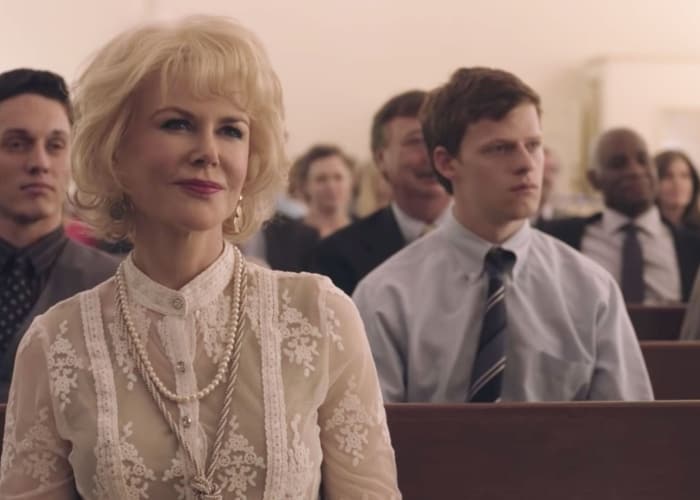
“God knows what’s on your heart” is a Christian maxim that, while not appearing in the Bible, is tossed around frequently in Protestant circles like those on display in Boy Erased. The phrase is never spoken in the film, which is based on Garrard Conley’s memoir of the same name, but it looms large over nearly every scene. Writer/director Joel Edgerton’s drama sets out to tackle several thorny questions surrounding good intentions, contrasting the detrimental effects of its gay conversion camp setting with religious adult characters’ frequent, earnest (yet clearly paradoxical) expressions of love and value for the LGBTQ teens in their care. Does what you say matter if it doesn’t line up with what you do? The question becomes doubly relevant when applied to Jared (Lucas Hedges), the pastor’s son who’s forced to join a program that believes “fake it til you make it” is the best path to heterosexuality. By movie’s end, we’re given an answer to the central question that’s at once emotional in its affirmation and rote in its obviousness.
Like the conversion therapy counselors who go through the motions of their one-size-fits-all program without ever attempting to understand the boys in their care, Boy Erased keeps us at an uneasy distance. Jared’s internal struggle is so internal that we barely learn anything about him, making a nearly two-hour movie feel unfinished. Edgerton’s script never divulges much about its protagonist, obscuring not only his relationship with a higher power and his personal understanding of self (instead filtering both through the pious perspective of the adults around him), but also anything resembling a personality outside of the buttoned-up Christian boy stock character. His blankness works only in that he could be a stand-in for anyone who has survived this harrowing situation, but his traumatic experiences are also fleshed out and specific in a way that contrasts oddly with his character’s overall hollowness. We see the erasure, but not enough of the boy.
Despite all this, Hedges does well in his role, communicating the muted frustration of a young man who’s never been allowed to express himself around elders who will take almost anything as a sign of disrespect. He wears Jared’s self-doubt like a mask, his tension clear by the set of his jaw, the squaring of his shoulders. First-time film actor Troye Sivan is magnetic as a fellow member of the Love in Action program, but like almost everyone else, he’s a sketch of a character who isn’t given satisfying closure. Several times, moments that are meant to be heartbreaking concern characters we barely know, making them evoke only the idea of sadness rather than sadness itself.
Russell Crowe disappears into the role of a man who can’t stop speaking Christian-ese long enough to see that he’s hurting his family, but it’s Nicole Kidman who steals every scene as Nancy Eamons, Jared’s fussy, funny mom. Of all the characters, she feels the most real, and Kidman and Edgerton pull off her touching storyline with finesse. A scene late in the movie between Kidman and Hedges makes visible the conversation that every gay kid wants to have with their parent — one that starts with an apology and ends with acceptance. That moment is invaluable, and hints at what Boy Erased could have been if all its characters were treated with as much warmth and depth as Kidman’s.
Edgerton, who also wrote and directed the 2015 thriller The Gift, fares better as a director than a writer this time around. On the surface, the visuals of Boy Erased match its stolid sensibility, with subdued colors and sparse cinematic flourishes, but inside the walls of Love in Action scenes play out like a horror movie. Sequences of slow motion and an intense, emotive score punctuate disturbing episodes of young men and women being trained to perform their gender roles through useless and increasingly cruel methods. The film is structured with several lengthy flashbacks of the months leading up to Jared’s two-week stay in the program, and in one Jared endures a trauma that leaves him hurt and confused. This is another resonant moment in the film, one with unspoken shades of complexity that manifest themselves in the muting of the world around him as he struggles to process. Boy Erased is at its best when showing, no commentary necessary, the isolating realities of living as a religious LGBTQ youth.
Boy Erased is not a bad movie, and perhaps it suffers above all else from bad timing; with the release of Desiree Akhavan’s The Miseducation of Cameron Post, an earthier, more entertaining Christian ex-gay camp movie that dropped earlier this year, it’s impossible to see this film outside the shadow of the other. Things this movie does well, like portraying Christian homophobes not as caricatures of evil but as real people with mixed-up motivations who still cause harm, were done earlier and with a more clear vision by Akhavan’s film. Jared’s story and the story of the 700,00 Americans who have undergone conversion therapy is worth telling, but here it’s only half-told.
Related Topics: Drama

